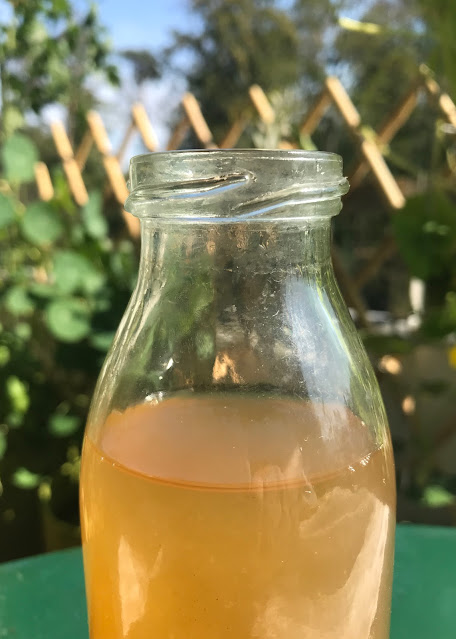- Wash and chop up the apples. Remove the core. If you have organic apples you can leave the peel on, otherwise peel them.
- Fill up a freshly washed and sterilized jar with the chopped apples. Leave about 2 inch space the apples and the rim of your jar. Add filtered water till it covers the apples.
- Cover the jar with a clean coffee filter. Secure the filter with a rubber band, and set the jar on the kitchen counter away from the direct sunlight.
- For the next three weeks, carefully stir the apples with a clean bamboo chopstick or a wooden spoon making sure that the apple chunks from the top move to the bottom and air bubbles escape the jar. The content of the jar will froth and become slightly murky. At this stage of fermentation you will get alcohol. Continue stirring the contents daily. Use fresh coffee filter every day. If mold forms, carefully remove it with a clean spoon. However, if the whole jar becomes moldy, toss everything out and start all over. Cleanliness is a must.
- Depending on the temperature of your kitchen and the kind of apples you used, you should be able to smell some vinegar at around three to four weeks. The liquid should not have anymore air bubbles. You can taste it now and also test the pH. At this stage the pH should be in the range of 4.5 and 3.0.
- Strain the content of the jar into another clean jar. Cover the liquid with a coffee filter and secure it with a rubber band. Place the jar on your kitchen counter and allow the liquid to mature for another two weeks.
- Replace the coffee filter with a regular lid and store it in you pantry. You can also decant your vinegar into a glass bottle for an easier use. With a pH of 3.5 to 3.0 your vinegar will store safely for a long time. You will be able to enjoy it in your salad dressings, marinades, health drinks, or even home made skincare. I will use mine to make Fire Cider.
Tip: Some people add sugar to speed up the first stage fermentation process. I used very sweet apples and decided not to add any sugar. If you are adding sugar, add about 1/4 cup per gallon of water. Also, do not use cheese cloth to cover the jars during fermentation or you will end up with swarms of fruit flies. Use coffee filter or clean kitchen towel. The fruit flies will appear even with a coffee filter, but not too many. Remember that vinegar fermentation is an aerobic process which means that oxygen is needed for the bacteria to do their work.
To make a raw raisin vinegar, use a clean jar, organic raisins, and purified water. The process is exactly the same, but it takes much longer. You may spot mold forming on the surface. This is not a big problem if your ferment smells clean and unspoiled. Simply remove the mold with a clean spoon and cover the jar for further fermentation. However, if the ferment smells bad or spoiled, toss everything out and start all over. You might have more mold during the process, so keep things really clean.
In radiant health, passionately raw - Dominique
Dominique Allmon©2022






